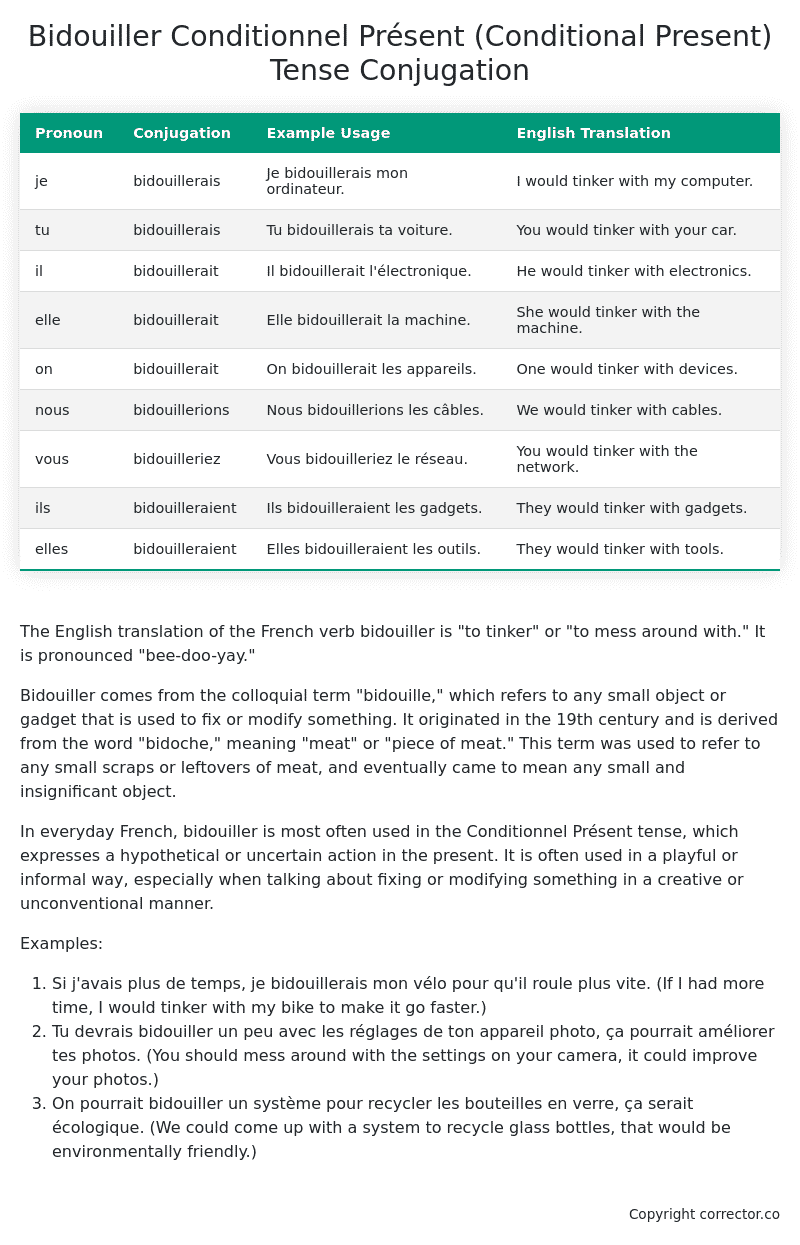Conditionnel Présent (Conditional Present) Tense Conjugation of the French Verb bidouiller
Introduction to the verb bidouiller
The English translation of the French verb bidouiller is “to tinker” or “to mess around with.” It is pronounced “bee-doo-yay.”
Bidouiller comes from the colloquial term “bidouille,” which refers to any small object or gadget that is used to fix or modify something. It originated in the 19th century and is derived from the word “bidoche,” meaning “meat” or “piece of meat.” This term was used to refer to any small scraps or leftovers of meat, and eventually came to mean any small and insignificant object.
In everyday French, bidouiller is most often used in the Conditionnel Présent tense, which expresses a hypothetical or uncertain action in the present. It is often used in a playful or informal way, especially when talking about fixing or modifying something in a creative or unconventional manner.
Examples:
- Si j’avais plus de temps, je bidouillerais mon vélo pour qu’il roule plus vite. (If I had more time, I would tinker with my bike to make it go faster.)
- Tu devrais bidouiller un peu avec les réglages de ton appareil photo, ça pourrait améliorer tes photos. (You should mess around with the settings on your camera, it could improve your photos.)
- On pourrait bidouiller un système pour recycler les bouteilles en verre, ça serait écologique. (We could come up with a system to recycle glass bottles, that would be environmentally friendly.)
Table of the Conditionnel Présent (Conditional Present) Tense Conjugation of bidouiller
| Pronoun | Conjugation | Example Usage | English Translation |
|---|---|---|---|
| je | bidouillerais | Je bidouillerais mon ordinateur. | I would tinker with my computer. |
| tu | bidouillerais | Tu bidouillerais ta voiture. | You would tinker with your car. |
| il | bidouillerait | Il bidouillerait l’électronique. | He would tinker with electronics. |
| elle | bidouillerait | Elle bidouillerait la machine. | She would tinker with the machine. |
| on | bidouillerait | On bidouillerait les appareils. | One would tinker with devices. |
| nous | bidouillerions | Nous bidouillerions les câbles. | We would tinker with cables. |
| vous | bidouilleriez | Vous bidouilleriez le réseau. | You would tinker with the network. |
| ils | bidouilleraient | Ils bidouilleraient les gadgets. | They would tinker with gadgets. |
| elles | bidouilleraient | Elles bidouilleraient les outils. | They would tinker with tools. |
Other Conjugations for Bidouiller.
Le Present (Present Tense) Conjugation of the French Verb bidouiller
Imparfait (Imperfect) Tense Conjugation of the French Verb bidouiller
Passé Simple (Simple Past) Tense Conjugation of the French Verb bidouiller
Passé Composé (Present Perfect) Tense Conjugation of the French Verb bidouiller
Futur Simple (Simple Future) Tense Conjugation of the French Verb bidouiller
Futur Proche (Near Future) Tense Conjugation of the French Verb bidouiller
Plus-que-parfait (Pluperfect) Tense Conjugation of the French Verb bidouiller
Passé Antérieur (Past Anterior) Tense Conjugation of the French Verb bidouiller
Futur Antérieur (Future Anterior) Tense Conjugation of the French Verb bidouiller
Subjonctif Présent (Subjunctive Present) Tense Conjugation of the French Verb bidouiller
Subjonctif Passé (Subjunctive Past) Tense Conjugation of the French Verb bidouiller
Subjonctif Imparfait (Subjunctive Imperfect) Tense Conjugation of the French Verb bidouiller
Subjonctif Plus-que-parfait (Subjunctive Pluperfect) Tense Conjugation of the French Verb bidouiller
Conditionnel Présent (Conditional Present) Tense Conjugation of the French Verb bidouiller (this article)
Conditionnel Passé (Conditional Past) Tense Conjugation of the French Verb bidouiller
L’impératif Présent (Imperative Present) Tense Conjugation of the French Verb bidouiller
L’infinitif Présent (Infinitive Present) Tense Conjugation of the French Verb bidouiller
Struggling with French verbs or the language in general? Why not use our free French Grammar Checker – no registration required!
Get a FREE Download Study Sheet of this Conjugation 🔥
Simply right click the image below, click “save image” and get your free reference for the bidouiller Conditionnel Présent tense conjugation!

Bidouiller – About the French Conditionnel Présent (Conditional Present) Tense
Formation
Common Everyday Usage Patterns
Expressing Polite Requests
Expressing Hypothetical Situations
Expressing Doubt or Uncertainty
Interactions with Other Tenses
Present Tense
Past Tense
Future Tense
Conditional Perfect
Summary
Want More?
I hope you enjoyed this article on the verb bidouiller. Still in a learning mood? Check out another TOTALLY random French verb conjugation!


